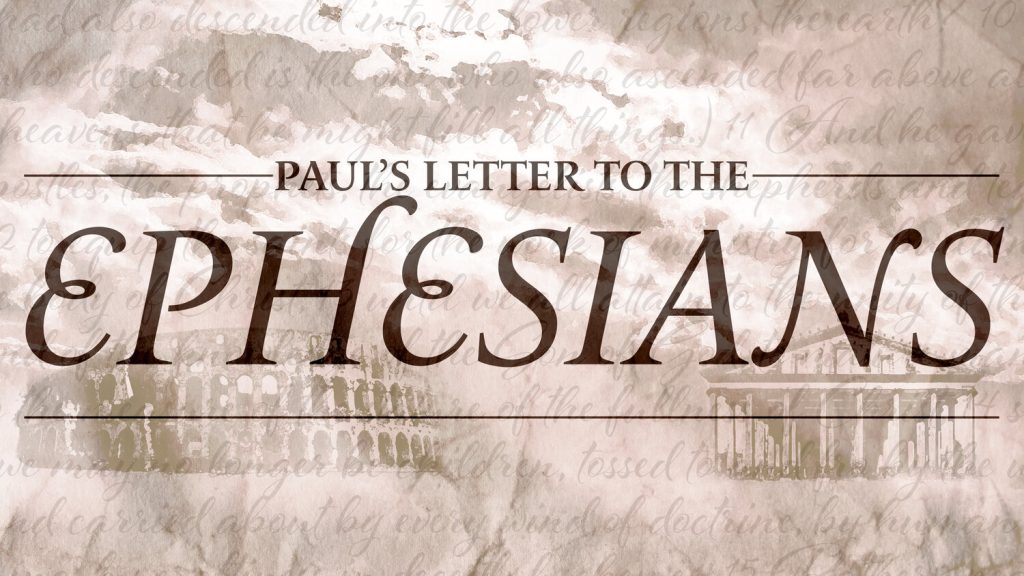Tonight we will discuss Ephesians 2:1-10. Here Paul writes about the Life found in Christ Jesus and that we are saved by grace not works.
God’s Riches: (v.4)
One of Paul’s favorite adjectives in Ephesians is the word “riches.” The Greek word is plousios, which derives from the word “abundance,” and means “wealthy,” “abounding in,” or “fully resourced.” This is the same word the Gospels use to describe the Rich Young Man who converses with Jesus (Matt. 19:16-30), the parable of the “Rich Fool” (Luke 12:13-21), and the parable of the “Rich Man and Lazarus” (Luke 16:19-31). Paul describes God as being rich (or having a super-abundance of) mercy (v.4) and grace (1:7, 2:7). Paul wants his audience to know and understand that God’s mercy and grace towards us is boundless and without limit. The well of God’s grace and mercy can never run dry because these riches are sourced from God’s eternal and unfailing love. As Jeremiah once wrote: “The steadfast love of the Lord never ceases, his mercies never come to an end.” Lam. 3:22.
With Christ: (vv.5-7)
Paul opens this reading in verse 1 with the statement “You he made alive when you were dead through the trespasses and sins” and he repeats the same in verse 5. Paul writes that we are made alive with Christ, raised up with Christ, and sit in the heavenly places with Christ. Paul writes that we have been saved (not will be). Throughout this verse, Paul speaks in the perfect tense – the act described has already been completed. We are united with Christ, and therefore, just as Christ has victory over the powers and principalities and passions of this world, so do we with him. See, Rom. 6:5. Paul tells us that God’s salvation is not simply a future occurrence to look forward to, but a very real present reality that brings light, life, and power into our lives now because we are with Christ now.
Paul does write that in the age to come, this very present reality will be fully and completely realized. v.7. Because we are still in this world which is under the dominion of the spiritual powers of this world, our salvation is not yet fully accomplished. Throughout the remainder of this letter, Paul will tell us how this life of already-but-not-yet is to be lived.
Grace and Salvation: (vv: 8-10)
Paul writes “For by grace you have been saved by faith.” v.8. For Paul saved means to be rescued from a fate that we would otherwise incur. We are rescued from the power of the prince of the air and from the death that follows. This salvation is solely due to God’s grace working through Christ. Nothing we do affects our salvation. Faith is not something that we do that makes us more acceptable to God or, in any way, brings about our salvation. Rather, the community of God’s people (i.e. the church) is marked out by our faith in Jesus Christ and his Resurrection in the same way that Jewish people are marked out by their obedience to the Law given by God to Moses. Faith has replaced the Law as the marker of God’s people. Our faith flows from God’s gracious gift of salvation, it does not cause it.
As Paul writes in verse 9, there is nothing that we can do to bring about our salvation. This would include not only obedience to the law given by God to Moses but also any action we can take. Going through a particular ritual or saying a particular prayer does not save us from the powers of this world and from death. If we can do something to bring about, confirm, or achieve our own salvation then we have a reason to boast abot our actions. However, because Paul tells us we have no reason to boast, therefore we have nothing that we can do to save ourselves.
God’s Workmanship: (v.10)
Paul ends this reading by writing that we are the workmanship of God. In other words, God has created us as a renewed way of being human, a way that it is fully in the image and likeness of God. These are the works that Paul will write about throughout the remainder of his letter – works of meekness, patience, forbearing, and reconciliation. Eph. 4:1-2. We also can see these works as the fruit of the spirit – love, joy, peace, patience, kindness, goodness, faithfulness, gentleness, and self-control. Gal. 5:22. These are the works to which we are called, and these are the works for which we have been remade.
Dinner is at 6. The menu is sloppy joes. Discussion at 6:45. Hope to see you here!
Someone has said there is nothing I can do to make God love me more, for God loves me perfectly already. And wonderfully, there is nothing I can do to make God love me less. God loves me as I am to help me become all that I have it in me to become, and when I realize the deep love God has for me, I will strive for love’s sake to do what pleases my Lover. Those who think this opens the door for moral laxity have obviously never been in love, for love is much more demanding than law. An exhausted mother, ready to drop dead into bed, will think nothing of sitting the whole night through by the bed of her sick child. – Archbishop Desmond Tutu, “No Future Without Forgiveness.”


Pingback: Ephesians 2:17-22, Realized Ecclesiology – Ancient Anglican